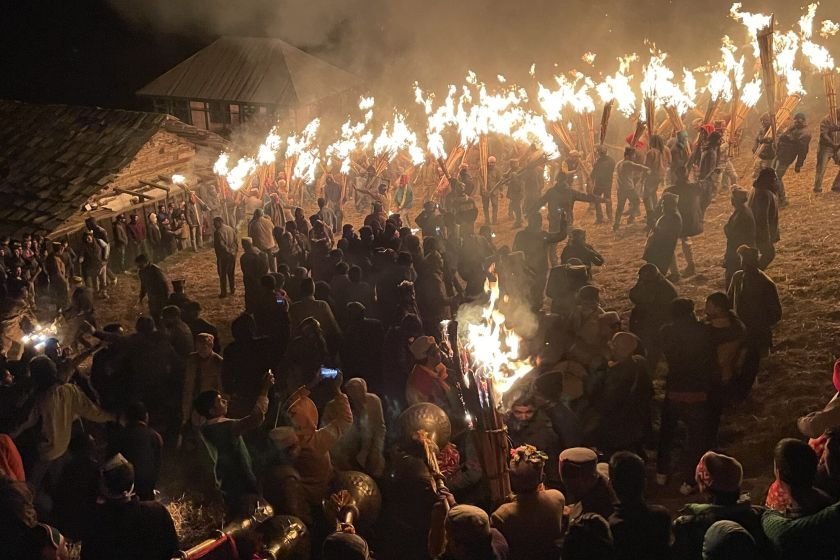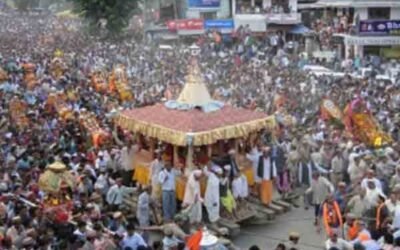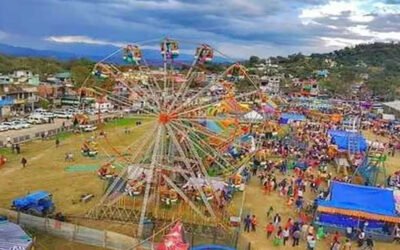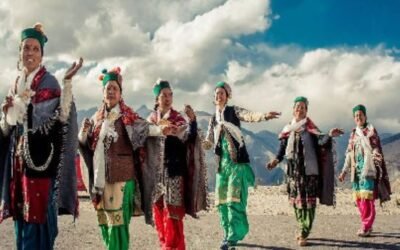📍 Location: Shilai tehsil and adjoining villages, Sirmaur District, Himachal Pradesh
📅 Season: November–December (approximately one month after Diwali, on Amavasya)
A local luminary of tradition, where lamps burn late and stories blaze bright beneath pine-lined horizons
🔱 A Festival Rooted in Rhythm and Return
Buddhi Diwali, meaning “Old Diwali,” is observed in parts of Shilai, Rajgarh, and Chopal where seasonal migrations, pastoral cycles, and delayed harvests meant that people couldn’t celebrate mainstream Diwali with the rest of India. So, they honor it later—with deeper sentiment and community involvement.
🐂 It also commemorates Lord Ram’s return to Ayodhya—but observed on a timeline that reflects local agricultural schedules and spiritual adaptations.
🔥 Rituals That Light Up the Hills
The celebration unfolds across courtyards and pine groves:
- Oil Lamps and Firelines: Villagers light rows of clay lamps on rooftops, boundaries, and cattle sheds to invite prosperity
- Animal Worship: Cows, bulls, and goats are washed, decorated, and honored with garlands and turmeric
- Bonfire Gatherings: Called “Aag Jalaai Jaati Hai”, large communal fires are lit where people dance, sing, and share stories
- Home Altars and Grain Offerings: Folk deities and ancestors are remembered through chawal, gur, and local grains
It’s not about grandeur—it’s about soulful reconnection.
🎶 Folk Culture in Full Glow
Though intimate, Buddhi Diwali is rich in traditional art forms:
- Ghar ki Nati: Performed by family members with drum and flute ensembles
- Dhol-Damau Songs: Local musicians play mythological rhythms deep into the night
- Oral Legends & Ballads: Elders narrate stories of Ramayana, village myths, and nature spirits under starlit skies
🗣️ The air rings with calls of “Deep Jalao Bhai!”—a communal invitation to light and love.
🍛 Culinary Simplicity and Sacred Sharing
Food during Buddhi Diwali is seasonal and soul-filling:
- Sirmauri Delicacies: Seera, meethi roti, bhey sabzi (lotus stem), and kadhi chawal
- Sweet Offerings: Batashe, homemade halwa, and puffed rice tossed with jaggery
- Village Feasts: Families eat together on leaf plates and pass prasad to neighbors in baskets and scarves
Meals become memories, and every morsel feels sacred.
✨ Why Buddhi Diwali Still Shines
This festival reflects:
- Cultural autonomy—celebration on local terms, at local pace
- Pastoral wisdom—valuing life’s slower cycles and animal companions
- Ancestral resonance—rituals passed down not through books, but through firelight conversations
It’s Himachal’s way of saying: Diwali isn’t late—it’s lived.
🧭 Plan Your Visit
To experience Buddhi Diwali in Shilai authentically:
- Date: Kartika Amavasya (lunar calendar); roughly one month post-Diwali
- Where to Go: Villages like Shilai, Bakras, Jamli, Ronhat, and adjoining hamlets
- Stay Options: Homestays or PWD rest houses; best coordinated with local families
- Travel Tip: Arrive before dusk to witness the lamp-lighting and stay for bonfire dances—you’ll witness emotion turned to tradition




